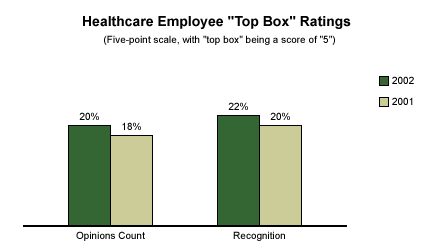In the past year, healthcare organizations have been under increasing stress. Financial growth has declined for many hospitals. Volumes have increased, and staffing increases, especially in the areas of nursing and radiology, have not been able to keep up. These trends have resulted in heightened pressure on staff members to work longer hours while maintaining the quality of their services.
Surprisingly, Gallup's employee engagement database indicates that engagement among healthcare workers has actually improved since 2001 among all 12 items on Gallup's Q12 survey -- the instrument that Gallup uses to measure employee engagement. However, improvement on two key items has lagged behind the rest.
- At work, my opinions seem to count.
- In the last seven days, I have received recognition or praise for doing good work.

"At work, my opinions seem to count."
In 2002, "At work, my opinions seem to count" received the lowest scores of the 12 items among healthcare workers. Although there has been a slight improvement since 2001, only 20% of healthcare workers scored this item as a 5 on a scale of 1 to 5 in 2002.
Why are healthcare scores so low for this question? One likely culprit is poor change management. Employees tend to be more accepting of change if they understand why it is happening and if they have input into the changes that are made. Clearly, many healthcare workers view change in their workplaces as imposed from above. They don't understand why changes are occurring and have little opportunity to provide input. The outcomes are lack of commitment to the process, disengagement and even resistance.
Gallup research shows that the most successful change in an organization's work environment is that which occurs at the workgroup level. Further, Gallup has discovered that engagement scores increase significantly when staff members participate in action-planning sessions aimed specifically at improving employee engagement. Across all industries, employees who participated in an action-planning session after their last Q12 survey had an overall mean engagement score of 3.61 on their next Q12 survey, compared to only 3.06 among those who did not participate in an action-planning session. These action-planning sessions are a basic way to show staff members that their opinions are valued.
"In the last seven days, I have received recognition or praise for doing good work."
This is the second lowest scoring Q12 item among healthcare workers. Only 22% scored this statement as a 5 in 2002, also up only two points from 2001.
Basic psychological theory asserts that if you want to encourage a certain behavior, you provide positive reinforcement for it. Clearly, doing good work is a behavior healthcare organizations wish to encourage, and yet often, little is done to encourage it. I often work with healthcare teams on improving patient loyalty scores. Nothing is more frustrating than meeting with a team that has significantly improved its scores, asking team members what they did to achieve their success and receiving only silence or "I don't know." If employees do not know what they did to achieve success, how can they be expected to maintain it?
Effective recognition or praise is not necessarily a function of organization-wide formal recognition programs. Recognition starts with each individual manager. First, managers must be as aggressive in understanding the foundations of success as they are in determining the causes of failure. Second, managers should continually seek out examples of great work so that it can be recognized and the actions leading to it reinforced.
Key Points
The two lowest scoring Q12 items among healthcare workers in 2001 also showed the least improvement in 2002. In order to improve employee scores on these items, healthcare organizations should concentrate on getting employees more involved in action planning and recognizing them more effectively when they do great work.
In this week's related story, I provide a discussion of the three Q12 items that have shown the greatest improvement between 2001 and 2002.
The Q12 items are protected by copyright of The Gallup Organization, Princeton, N.J., 1992-1999.